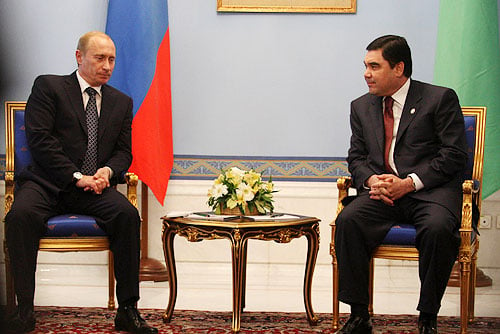Scoreboard on Central Asian energy:
Russia: 0
Europe: +2
Turkmenistan: +10

Russian Prime Minister Vladimir Putin and Turkmen President Gurbanguly Berdymukhamedov. Source: Wikimedia Commons.
Euraisanet reported on Friday that Russia maintained a huge loss to its energy portfolio at a recent two-day energy security conference in Ashgabad, Turkmenistan. Turkmenistan, a very energy rich Central Asian dictatorship and former Soviet republic, is undoubtedly close to Moscow for historic reasons. Gazprom has a virtually exclusive monopoly over all Turkmen natural gas. On Friday, Turkmen President Gurbanguly Berdymukhamedov set about putting an end to that. Berdymukhamedov stated:
“Today we are looking for conditions to diversify energy routes and the inclusion of new countries and regions. Turkmenistan must create a new system of relations with Europe. In the current situation, the diversification of energy routes could help to stabilize the global economy.”
Berdymukhamedov’s new position was undoubtedly met with much celebration in Washington. US Deputy Assistant Secretary of State George Krol welcomed the statement, saying:
“We want to support partnerships throughout Eurasia, and we will advocate for those partnerships that respect the sovereign states in the region at the conference, a rare international meeting in Turkmenistan. We strongly support the diversification of energy markets and transit routes, both among Central Asian states and between this region and broader international markets.”
All this means good news for the planned Nabucco Pipeline which would supposedly connect Turkmen gas with routes under the Caspian Sea, to Azerbaijan, then through the Caucasus (Azerbaijan and Georgia), and then via Turkey and the Balkans to Vienna. Turkmenistan’s stated willingness to diversify means that someone in Brussels working on Nabucco is doing his work.
This also spells bad news for the competition: Russia’s South Stream Pipeline, planned for a route under the Black Sea to avoid Ukraine’s tempermental transit. On Friday, Russian Prime Minister Vladimir Putin cancelled at the last minute on a gas summit in Sofia, Bulgaria. Reports allege that he boycotted the summit in protest of the Nabucco plans. Putin’s boycott seemed to hurt Russia even more, resulting in Bulgaria’s postponement of participation in the South Stream.